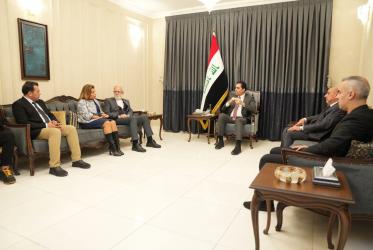Your Excellency,
Your All Holiness, Beatitudes and Eminences,
Dear sisters and brothers,
As General Secretary of the World Council of Churches, I would like to express my deep thanks to the Government of Greece and to the Hellenic Ministry of Foreign Affairs for convening this honourable assembly to examine what it takes to establish a just peace of coexistence in the Middle East. To achieve that, it is very adequate to focus on what would maintain and reinforce the cultural and religious diversity that has distinguished this region for long centuries. The future presence in the homeland of some of these communities is at risk and there is a need to focus on the protection needed for all human beings who are victims of all kinds of violence, also from governments. Furthermore, it is important to mobilize the contributions of the religious communities and their faith traditions for a just peace. I am encouraged to hear how their representatives affirm the dignity of each human being and their rights as citizens, as well as their strong call to end all violence and their denial of weapons as means to solve these conflicts. From the beginning to the end we all must have the focus on the human lives, the human dignity and rights and the human suffering in this tragedy we see.
Therefore, I will acknowledge what the people, the Government and the Church of Greece and other faith communities here do to show generous hospitality and solidarity towards the hundreds of thousands refugees. They are escaping terrible wars in neighbouring countries and trying to find refuge and a safe haven in Europe. Some of us from the WCC visited last Friday Idomeni at the border between Greece and Serbia, and listened to the traumas and expectations of the people there. It was good to see how the residents and volunteers there met people, affirming their human dignity in such a situation. Metropolitan Dimitrios of Gomenissa and Polykastron said they all carry the image of God, whatsoever religion they have. I was even more struck by how the refugees themselves keep their human qualities of care, dignity, and hope. This is a lesson for us all, including the churches.
The religions and the people of the Middle East belong to the countries in the Middle East. It is a historic tragedy that so many are leaving their homes and their communities now. The World Council of Churches cultivated relations and cooperation with many Muslim and Jewish leaders and institutions, initiating and facilitating dialogue and joint initiatives on critical issues that are important for conviviality among the different faith communities.
Together with our member churches and other churches in the region, we have always considered that religious diversity and multiculturalism constitute an intrinsic dimension of the region’s identity.
The WCC is particularly deeply concerned about the presence and witness of the Christians in the Middle East. Today, their very existence is threatened, and with it the whole rich diversity of the region. It is time for working and walking together in Christian unity. In this we are united also by the blood of the martyrs and the suffering of the people, significantly shown by even kidnapping religious leaders. We again appeal for the immediate release of the two Metropolitans and others named here today. But we are not searching a unity against the brothers and sisters of other faiths, but to be on a pilgrimage for justice and peace of all people of faith and hope and good will.
It is the responsibility of the states to protect the lives of all their citizens and of the international community to take its responsibility and find immediate measures that will build a just peace in the region. Only a just peace for all will give hope for the preservation of the cultural and religious diversity, also the future of Christians in the region. We has expressed in several common statements with representatives of our member churches in the last years that we do not believe in military solutions to the situation in Syria. What we have recently said about the military escalation in Syria also sadly applies to the situation in the whole region: “the inability of the international community to find common political solutions has become ethically unbearable”.
We need the support I hear in this conference for a peace process which should be inclusive in nature. This includes new practical initiatives, involving the religious communities and the dialogue between them. Let us see the building of new social and political foundations that respond to the new aspirations of the younger generation. In this perspective we honour the Nobel Peace Prize laureates of 2015 from Tunisia, for their example of how actors of faith and civil society can contribute to a culture of democracy and peace.
In this perspective we strongly support the initiative of observing together, to see together so that we can act together.
Protection must primarily come through the rule of law and justice, nationally and internationally. We believe that all peoples in the region in their different countries deserve a real alternative to what they are facing right now.
As a fellowship of churches worldwide, we are deeply committed to support initiatives for just peace for the whole Middle East regions. In a region troubled by so much turbulence, our faith and hope mean that we are capable of seeing the crucified and risen Christ being with us in the midst of all tribulations. We are called to be co-workers with the Holy Spirit who dwells in us to be agents of peace and justice. Despite being few in number, Christians in the region are, as Jesus said in the Gospel, the “little yeast that works through the whole batch of dough”. This is a symbol of the positive coexistence we all need and believe in.
WCC general secretary
Rev. Dr Olav Fykse Tveit



